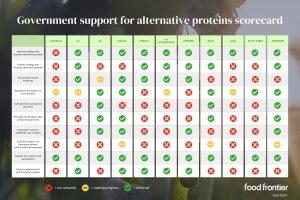New research comparing global government support for alternative proteins finds Australia in last place among 10 countries. 
Food Frontier’s ‘Government support for alternative proteins scorecard’ reveals that countries including Singapore, Israel, the US and Canada are picking up the pace when it comes to supporting the transition towards more alternative proteins, driven by health, environmental and economic benefits.
According to Food Frontier, Australia falls “dramatically short” across 10 key parameters considered crucial for the growth of the industry, scoring just 1.5 compared with Canada and Singapore’s score of 7.5.
“This comparison clearly indicates where Australia is lagging and should serve as a wake-up call to [embrace] the opportunities available,” says Food Frontier CEO Dr Simon Eassom.
“Certain countries have already established themselves as global leaders in the plant-based and cultivated meat industries and capitalising on the benefits of this. With the right government support, Australia can thrive in this sector too, and cement its own place as a leader in food and agricultural production.”
Areas to address
Despite some positive scores, including a regulatory framework suitable for novel proteins and strong research and development, Australia has not yet progressed in several key areas, says Food Frontier. These include dietary guidelines that prioritise plant proteins (although the guidelines are currently being updated, with the potential for sustainability messaging to be included), plant protein farmer incentives, sufficient support for infrastructure, and adequate funding.
Citing the Good Food Institute’s 2023 ‘State of Global Policy’, Food Frontier says that while the US, Canada, Denmark and Singapore have each surpassed the US$100 million mark for total public funding (up to 2023), Australia has invested only US$53.7 million in alternative proteins.
“Australia is also the only country included in the scorecard to not have a national strategy that includes alternative proteins,” says Food Frontier. “However, we’re aware government bodies like the Climate Change Authority are currently investigating alternative proteins in their recommendations to government.
“Globally, governments are setting clear targets and roadmaps for success by implementing these strategies, such as Singapore’s ‘30 by 30’ food security initiative and Denmark’s plant-based action plan.”
A national food plan that supports existing agrifood industries to become more sustainable and prioritises the growth of innovative food industries, including alternative proteins, is one of Food Frontier’s recommendations to government outlined in the recent ‘Alternative proteins and food systems transformation’ report.
“Australia should take advantage of its proximity to Asia, as it’s well positioned to tap into the region’s growing appetite for plant-based and cultivated proteins,” says Food Frontier.
“Not only will embracing alternative proteins provide value-add to the economy, [but] it also presents a chance for Australian farmers and grain growers to diversify their revenue streams and adapt to changing consumer preferences.
“Australia has the potential to remain competitive in the global food industry, but to do so we need far more decisive action across all 10 critical areas.”





